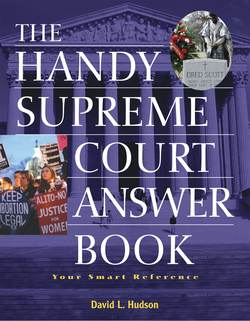Читать книгу The Handy Supreme Court Answer Book - David L Hudson - Страница 228
На сайте Литреса книга снята с продажи.
In what famous decision did Marshall broadly define Congress’s interstate commerce powers?
ОглавлениеThe Marshall Court broadly defined commerce in its 1824 decision in Gibbons v. Ogden in a battle of steamboat entrepreneurs. The state of New York granted an exclusive license to Robert Livingston and Robert Fulton, the inventor of the steamboat, to operate steamboats in the New York Harbor and the Hudson River. Livingston and Fulton then licensed Aaron Ogden to operate steamboats from New York City to Elizabethtown, New Jersey.
Steamboats, similar to Robert Fulton’s Clermont, shown here in the New York harbor, were the focus of the Gibbons v. Ogden interstate commerce case in 1824. Getty Images.
Ogden’s former business partner, Thomas Gibbons, wanted to break up this monopoly. He had acquired a federal permit to operate steamboats between New York and New Jersey. Gibbons contended that because he had a federal permit, he did not need to obtain permission from the state of New York. Ogden sued Gibbons, arguing that Gibbons’s activities were infringing on Ogden’s exclusive monopoly from the state of New York. Ogden sought an injunction, ordering Gibbons to cease infringing on his exclusive privilege.
Gibbons, backed by the wealthy Cornelius Vanderbilt, fought back in court by hiring perhaps the best lawyer in America—Daniel Webster. The U.S. Supreme Court ruled that Ogden’s exclusive monopoly was invalid because it infringed on Congress’s Commerce Clause powers. Marshall broadly defined the powers of Congress’s commerce powers, writing: “Commerce, undoubtedly, is traffic, but it is something more: it is intercourse. It describes the commercial intercourse between nations, and parts of nations, in all its branches, and is regulated by prescribing rules for carrying on that intercourse.” The decision was important because it was an example of the U.S. Supreme Court broadly defining Congress’s Commerce Clause powers.
CourtSpeak: Gibbons v. Ogden Interstate Commerce Case (1824)
Chief Justice John Marshall (on navigation as a form of commerce): “If commerce does not include navigation, the government of the Union has no direct power over that subject, and can make no law prescribing what shall constitute American vessels, or requiring that they shall be navigated by American seamen. Yet this power has been exercised from the commencement of the government, has been exercised with the consent of all, and has been understood by all to be a commercial regulation. All America understands, and has uniformly understood, the word ‘commerce,’ to comprehend navigation. It was so understood, and must have been so understood, when the constitution was framed. The power over commerce, including navigation, was one of the primary objects for which the people of America adopted their government, and must have been contemplated in forming it. The convention must have used the word in that sense, because all have understood it in that sense; and the attempt to restrict it comes too late.”
Marshall (on the broad scope of Congress’s commerce powers): “We are now arrived at the inquiry—What is this power? It is the power to regulate; that is, to prescribe the rule by which commerce is to be governed. This power, like all others vested in Congress, is complete in itself, may be exercised to its utmost extent, and acknowledges no limitations, other than are prescribed in the constitution. These are expressed in plain terms, and do not affect the questions which arise in this case, or which have been discussed at the bar. If, as has always been understood, the sovereignty of Congress, though limited to specified objects, is plenary as to those objects, the power over commerce with foreign nations, and among the several States, is vested in Congress as absolutely as it would be in a single government, having in its constitution the same restrictions on the exercise of the power as are found in the constitution of the United States. The wisdom and the discretion of Congress, their identity with the people, and the influence which their constituents possess at elections, are, in this, as in many other instances, as that, for example, of declaring war, the sole restraints on which they have relied, to secure them from its abuse. They are the restraints on which the people must often they solely, in all representative governments.
“The power of Congress, then, comprehends navigation, within the limits of every State in the Union; so far as that navigation may be, in any manner, connected with ‘commerce with foreign nations, or among the several States, or with the Indian tribes.’ It may, of consequence, pass the jurisdictional line of New York, and act upon the very waters to which the prohibition now under consideration applies.”
